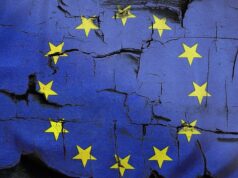According to the London government, the „Brexit“ subcontractors have agreed on an EU exit agreement for the UK – but the deal is not yet in the towel. There are still hurdles from the British Cabinet to the Parliament in London and the European Parliament in Strasbourg.
Already a month ago a first draft of the contract had been submitted, the conclusion seemed within reach. But the government of British Prime Minister Theresa May rejected this. Since then, intensive negotiations have been held again. In a first step, May has to convince her cabinet by Wednesday afternoon. That’s why she invited her ministers on Tuesday evening for individual talks in the seat of government to give them insight into the several hundred pages comprehensive draft document.
However, it will be much more difficult for them to get support in Parliament. Because there threatened members of the Northern Irish DUP and members of the Tory party so far, to fail the deal, should their demands are not met.
Tory politicians are sharply criticized
Sharp criticism of the draft was on Tuesday by ex-Foreign Minister Boris Johnson and the influential Tory MP Jacob Rees-Mogg. They accused May of being subjected to Brussels in interviews. Britain is degrading to the EU’s vassal state and is about to give Dublin partial control of Northern Ireland. The two „Brexit“ -Hardliners are regarded as the strongest opponent of May and will vote in Parliament in all probability against the draft.
Draft: GB should remain part of the Customs Union
According to insiders, Britain and Northern Ireland should remain temporarily in a customs union with the EU – and Northern Ireland in the EU single market. This means that a hard border between Northern Ireland and Ireland would be avoided. But many Tory party members reject this point.
Draft for „Brexit“ agreement
London announces agreement between Britain and the EU. Now British Prime Minister Theresa May has to convince her own government team and members of the lower house.
More videos in news.ORF.at
Mays minority government, in addition to members of its own party particularly rely on the votes of the DUP, which rejects a customs border between Ireland and Northern Ireland. DUP vice-president Nigel Dodds doubts that May can seduce her critics with the draft. However, she will first study the text of the agreement before making a decision, Dodds continued on Tuesday evening. However, Dup chief Arlene Foster warned May that her party could vote against the deal if it undermines the union of Britain and Northern Ireland.
Opposition wants to change contract before vote
The main British opposition parties also demanded a right to treaty change on Tuesday. Labor leader Jeremy Corbyn, in a joint letter with the leaders of the Scottish National Party and the Liberal Democrats, demanded that modifications to the agreement be allowed before the vote. Only then is it a meaningful vote. The government in London, on the other hand, has stated that there should be no change options before a vote. The opposition leaders described the lals attempt to „muzzle“ the parliament.
Behaviors from Brussels
From Brussels, there have been only cautious reactions so far. On Wednesday at 15.00, the EU ambassadors of the remaining 27 EU countries would be informed about the current status of the „Brexit“ negotiations, it was said from Ratskreisen to ORF.at. „Negotiations between the EU and the United Kingdom over a withdrawal agreement are ongoing and not completed,“ said a spokesman for Irish Foreign Minister Simon Coveney. The Irish government has also scheduled a meeting in Dublin on Wednesday morning due to current events.
Blümel about the „Brexit“ developments
From Brussels there is so far no confirmation of the „Brexit“ agreement. EU Minister Gernot Blümel addresses the question of what consequences it has if Theresa May does not get a majority for the deal.
In the ZIB2 European Minister Gernot Blümel (ÖVP) held that it was important that there is an orderly resignation and „no hard, Brexit ‚“. Nobody could be interested in such a thing. For the UK, he would be „even worse“ than for the EU. „Britain is right to push for a clear contract.“ Manfred Weber, Group leader of the European People’s Party, confirmed the breakthrough in the „Brexit“ negotiations. „Yes, the white smoke rises. We have positive signals that, after weeks and months of tormenting debates, an agreement is finally reached, „he said on Tuesday evening in the ARD“ Tagesthemen „.
Special Summit in November?
An agreement must be reached by December at the latest to allow ratification by parliaments on both sides in good time before the „Brexit“ date. An EU Special Summit scheduled for November to conclude the negotiations has therefore been postponed until further notice. If the announced agreement in Parliament in Westminster find no majority or be rejected by the EU Parliament, threatening to leave without agreements – with chaotic consequences for all areas of life. Even a new election or a second „Brexit“ referendum are not excluded in this scenario.
British Deputy Prime Minister David Lidington told broadcaster BBC on Tuesday that an agreement by Wednesday night was „still possible but not safe“. Until then, according to British officials, the agreement would have to stand so that Brussels could call a special summit for this month. Otherwise, the graduation will be delayed until mid-December. May would then have little time to get the agreement through the lower house until March 29th.
EU increased pressure with emergency plan
Earlier, Brussels had put London under pressure with a published „Brexit“ emergency plan. This included a series of measures – sometimes on visa issues, air traffic and customs duties – if negotiations with Great Britain fail. Financial services, hygiene and plant regulations, the transfer of personal data and climate policy were mentioned by the EU Commission as additional areas in the emergency plan.
„We are working very hard to reach an agreement with the United Kingdom,“ said Commission Vice-President Frans Timmermans in Strasbourg. „We are making progress, but we are not there yet.“ It was the EU’s duty to prepare „for all the results“ of the „Brexit“ negotiations.



